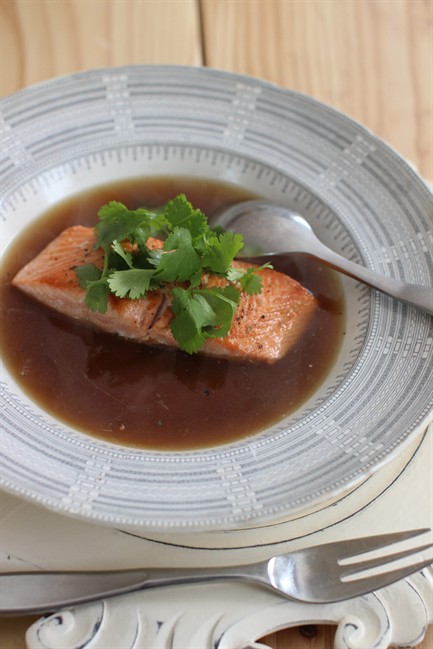King salmon, also known by its Native American name “chinook,” earns the title. The largest of the Pacific salmon, a single king can weigh more than 100 pounds, though typically they’re landed at 20 to 30 pounds. King salmon is prized for its silky red flesh, buttery texture and for a high oil content that gives it a luxurious flavour.

“The kings are definitely special,” says Laura Cole, owner and executive chef at 229 Parks in Alaska’s Denali National Park. “They’re just more rich and wonderful. But you have to pay more homage to the fish than to the flavours on the plate.”
READ MORE: Primer – 5 varieties of wild Alaskan salmon – king, sockeye, coho, keta and pink
King salmon from Copper River in south-central Alaska are among the first salmon commercially harvested in the state each year, and among the first to show up fresh in stores. King salmon run for three or four weeks from mid-May to mid-June.
Recommended preparations: The king’s high oil content makes it tolerant of any preparation from grilling to poaching. Regardless of how it’s cooked, chefs say to go easy on the seasonings; let the fish speak for itself.
Often found: You’ll see it most often in sushi; at the centre of a restaurant plate; and as steaks, fillets and whole fish at fish counters.
Availability: Can be found fresh and frozen throughout the year, but fresh peaks mid-May to July.
—
- Canadian man dies during Texas Ironman event. His widow wants answers as to why
- Several baby products have been recalled by Health Canada. Here’s the list
- ‘Sciatica was gone’: hospital performs robot-assisted spinal surgery in Canadian first
- Canadian food banks are on the brink: ‘This is not a sustainable situation’
SEARED KING SALMON WITH LEMONGRASS PORCINI JUS
Always check salmon for bones. To do this, gently rub your hand over the flesh, going against the grain. The bones should be in a line running the length of the fish. Use tweezers or needle pliers to remove.
Start to finish: 20 minutes
Servings: 6
- 6-inch piece lemon grass
- 2 cloves garlic
- 1-inch chunk fresh ginger
- 1/2 ounce dried porcini mushrooms
- 1 small yellow onion, quartered
- 4 cups water
- 2 tablespoons low-sodium soy sauce
- 2 tablespoons vegetable oil
- 2 pounds king salmon, cut into 6 pieces
- Fresh cilantro leaves
- Flaked sea salt and ground black pepper
Use the back of a large knife or a meat mallet to mash the lemon grass to break up the fibers. Lightly smash the garlic cloves and the ginger.
In a large saucepan over medium-high, combine the lemon grass, garlic, ginger, dried mushrooms, onion and water. Bring to a simmer, then reduce heat to low and cover. Cook for 15 minutes. Pour the mixture through a mesh strainer and discard the solids. Stir in the soy sauce. Set aside.
Heat a heavy skillet, preferably cast iron, over high heat. Add the oil and turn to coat the bottom of the pan. Sear the salmon for 1 to 2 minutes per side. Ladle the jus into shallow bowls, placing a piece of salmon in the centre of each. Top with fresh cilantro, then season with salt and pepper. Serve immediately.
Nutrition information per serving: 340 calories; 200 calories from fat (59 per cent of total calories); 22 g fat (3 g saturated; 0 g trans fats); 90 mg cholesterol; 4 g carbohydrate; 1 g fiber; 1 g sugar; 32 g protein; 270 mg sodium.

Comments